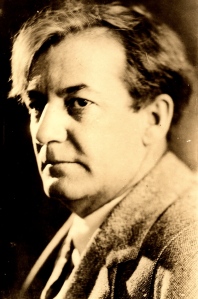For a year now I have been thinking of writing a certain book. “Well, tomorrow I’ll get at it,” I’ve been saying to myself. Every night when I get into bed I think about the book. The people that are to be put between its covers dance before my eyes. I live in the city of Chicago and at night motor trucks go rumbling along the roadway outside my house. Not so very far away there is an elevated railroad and after twelve o’clock at night trains pass at pretty long intervals. Before it began I went to sleep during one of the quieter intervals but now that the idea of writing this book has got into me I lie awake and think.
I get into bed I think about the book. The people that are to be put between its covers dance before my eyes. I live in the city of Chicago and at night motor trucks go rumbling along the roadway outside my house. Not so very far away there is an elevated railroad and after twelve o’clock at night trains pass at pretty long intervals. Before it began I went to sleep during one of the quieter intervals but now that the idea of writing this book has got into me I lie awake and think.
For one thing it is hard to get the whole idea of the book fixed in the setting of the city I live in now. I wonder if you, who do not try to write books, perhaps will understand what I mean. Maybe you will, maybe you won’t. It is a little hard to explain. You see, it’s something like this. 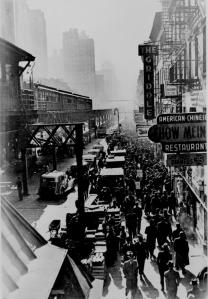
You as a reader will, some evening or some afternoon, be reading in my book and then you will grow tired of reading and put it down. You will go out of your house and into the street. The sun is shining and you meet people you know. There are certain facts of your life just the same as of mine. If you are a man, you go from your house to an office and sit at a desk where you pick up a telephone and begin to talk about some matter of business with a client or a customer of your house. If you are an honest housewife, the ice man has come or there drifts into your mind the thought that yesterday you forgot to remember some detail concerned with running your house. Little outside thoughts come and go in your mind, and it is so with me too. For example when I have written the above sentence, I wonder why I have written the words “honest housewife.” A housewife I suppose can be as dishonest as I can. What I am trying to make clear is that, as a writer, I am up against the same things that confront you, as a reader.
What I want to do is to express in my book a sense of the strangeness that has gradually, since I was a boy, been creeping more and more into my feeling about everyday life. It would all be very simple if I could write of life in an interior city of China or in an African forest. A man I know has recently told me of another man who, wanting to write a book about Parisian life and having no money to go to Paris to study the life there, went instead to the city of New Orleans. He had heard that many people lived in New Orleans whose ancestors were French. “They will have retained enough of the flavor of Parisian life for me to get the feeling,” he said to himself. The man told me that the book turned out to be very successful and that the city of Paris read with delight a translation of his work as a study of French life, and I am only sorry I can’t find as simple a way out of my own job. The whole point with me is that my wish to write this book springs from a somewhat different notion. “If I can write everything out plainly, perhaps I will myself understand better what has happened,” I say to myself and smile. During these days I spend a good deal of time smiling at nothing. It bothers people. “What are you smiling about now?” they ask, and I am up against as hard a job trying to answer as I am trying to get underway with my book.
in New Orleans whose ancestors were French. “They will have retained enough of the flavor of Parisian life for me to get the feeling,” he said to himself. The man told me that the book turned out to be very successful and that the city of Paris read with delight a translation of his work as a study of French life, and I am only sorry I can’t find as simple a way out of my own job. The whole point with me is that my wish to write this book springs from a somewhat different notion. “If I can write everything out plainly, perhaps I will myself understand better what has happened,” I say to myself and smile. During these days I spend a good deal of time smiling at nothing. It bothers people. “What are you smiling about now?” they ask, and I am up against as hard a job trying to answer as I am trying to get underway with my book.
Sometimes in the morning I sit down at my desk and begin writing, taking as my subject a scene from my own boyhood.
Very well, I am coming home from school. The town in which I was born and raised was a dreary, lonely little place in the far western section of the state of Nebraska, and I imagine myself walking along one of its streets. Sitting upon a curbing before a store is a sheep herder who has left his flock many miles away in the foothills at the base of the western mountains and has come into our town, for what purpose he himself does not seem to know. He is a bearded man without a hat and sits with his mouth slightly open, staring up and down the street. There is a half-wild uncertain look in his eyes 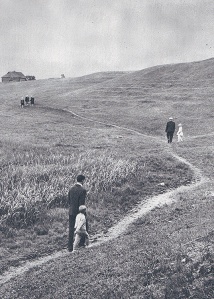 and his eyes have awakened a creepy feeling in me. I hurry away with a kind of dread of some unknown thing eating at my vital organs. Old men are great talkers. It may be that only kids know the real terror of loneliness.
and his eyes have awakened a creepy feeling in me. I hurry away with a kind of dread of some unknown thing eating at my vital organs. Old men are great talkers. It may be that only kids know the real terror of loneliness.
I have tried, you see, to start my book at that particular point in my own life. “If I can catch exactly the feeling of that afternoon of my boyhood, I can give the reader the key to my character,” I tell myself.
The plan won’t work. When I have written five, ten, fifteen hundred words, I stop writing and look out at my window. A man is driving a team of horses hitched to a wagon-load of coal along my street and is swearing at another man who drives a Ford. They have both stopped and are cursing each other.
The coal wagon driver’s face is black with coal dust but anger has reddened his cheeks and the red and black have produced
a dusky brown like the skin of a Negro. I have got up from my typewriter and walk up and down in my room smoking cigarettes. My fingers pick up little things on my desk and then put them down.
I am nervous like the race horses I used to be with at one period of my boyhood. Before a race and when they had been brought out on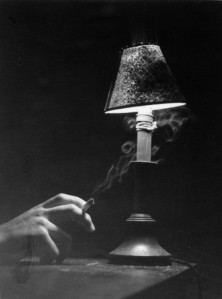 the tracks before all the people and before the race started, their legs quivered. Sometimes there was a horse got into such a state that when the race started he would do nothing. “Look at him. He can’t untrack himself,” we said.
the tracks before all the people and before the race started, their legs quivered. Sometimes there was a horse got into such a state that when the race started he would do nothing. “Look at him. He can’t untrack himself,” we said.
Right now I am in that state about my book. I run to the typewriter, write for a time, and then walk nervously about. I smoke a whole package of cigarettes during the morning.
And then suddenly I have again torn up all I have written. “It won’t do,” I have told myself. In this book I am not intending to try to give you the story of my life. “What of life, any man’s life?—forked radishes running about, writing declarations of independence, telling themselves little lies, having dreams, getting puffed up now and then with what is called greatness. Life begins, runs its course and ends,” a man I once knew told me one evening, and it is true. Even as I write these words a hearse is going through my street. Two young girls, who are going off with two young men to walk I suppose in the fields where the city ends, stop laughing for a moment and look up at the hearse. It will be a moment before they forget the passing hearse and begin laughing again.
“A life is like that, it passes like that,” I say to myself as I tear up my sheets and begin again walking and smoking the cigarettes. If you think I am sad, having these thoughts about the brevity and insignificance of a life, you are mistaken. In the state I am in such things do not matter. “Certain things last,” I say to myself. “One might make things a little clear. One might even imagine a man, say a Negro, going along a 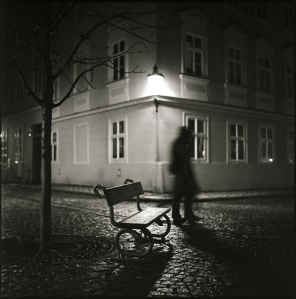 city street and humming a song. It catches the ear of another man who repeats it on the next day. A thin strand of song, like a tiny stream far up in some hill, begins to flow down into the wide plains. It waters the fields. It freshens the air above a hot stuffy city.”
city street and humming a song. It catches the ear of another man who repeats it on the next day. A thin strand of song, like a tiny stream far up in some hill, begins to flow down into the wide plains. It waters the fields. It freshens the air above a hot stuffy city.”
Now I have got myself worked up into a state. I am always doing that these days. I write again and again tear up my words.
I go out of my room and walk about.
I have been with a woman I have found and who loves me. It has happened that I am a man who has not been loved by women and have all my life been awkward and a little mixed up when in their presence. Perhaps I have had too much respect for them, have wanted them too much. That may be. Anyway I am not so rattled in her presence.
She, I think, has a certain control over herself and that is helpful to me. When I am with her I keep smiling to myself and thinking, “It would be rather a joke all around if she found me out.”
When she is looking in another direction I study her a little. That she should seem to like me so much surprises me and I am sore at my own surprise. I grow humble and do not like my humbleness either. “What is she up to? She is very lovely. Why is she wasting her time with me?”
I shall remember always certain hours when I have been with her. Late on a certain Sunday afternoon I remember I sat in a chair in a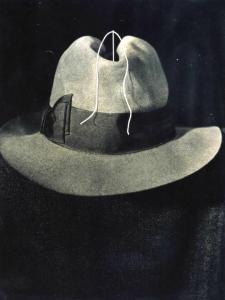 room in her apartment. I sat with my hand against my cheek, leaning a little forward. I had dressed myself carefully because I was going to see her, had put on my best suit of clothes. My hair was carefully combed and my glasses carefully balanced on my rather large nose. And there I was, in her apartment in a certain city, in a chair in a rather dark corner, with my hand against my cheek, looking as solemn as an old owl. We had been walking about and had come into the house and she had gone away leaving me sitting there, as I have said. The apartment was in a part of the city where many foreign people live and from my chair I could, by turning my head a little, look down into a street filled with Italians.
room in her apartment. I sat with my hand against my cheek, leaning a little forward. I had dressed myself carefully because I was going to see her, had put on my best suit of clothes. My hair was carefully combed and my glasses carefully balanced on my rather large nose. And there I was, in her apartment in a certain city, in a chair in a rather dark corner, with my hand against my cheek, looking as solemn as an old owl. We had been walking about and had come into the house and she had gone away leaving me sitting there, as I have said. The apartment was in a part of the city where many foreign people live and from my chair I could, by turning my head a little, look down into a street filled with Italians.
It was growing dark outside and I could just see the people in the street. If I cannot remember facts about my own and other people’s lives, I can always remember every feeling that has gone through me, or that I have thought went through anyone about me. The men going along the street below the window all had dark swarthy faces and nearly all of them wore, somewhere about them, a spot of color. The younger men, who walked with a certain swagger, all had on flaming red ties. The street was dark but far down the street there was a spot where a streak of sunlight still managed to find its way in between two tall buildings and fell sharp against the face of a smaller red-brick building. It pleased my fancy to imagine the street had also put on a red necktie, perhaps because there would be lovemaking along the street before Monday morning.
 Anyway I sat there looking and thinking such thoughts as came to me. The women who went along the street nearly all had dark colored shawls drawn up about their faces. The road-way was filled with children whose voices made a sharp tinkling sound.
Anyway I sat there looking and thinking such thoughts as came to me. The women who went along the street nearly all had dark colored shawls drawn up about their faces. The road-way was filled with children whose voices made a sharp tinkling sound.
My fancy went out of my body in a way of speaking, I suppose, and I began thinking of myself as being at that moment in a city in Italy. Americans like myself who have not traveled are always doing that. I suppose the people of another nation would not understand how doing it is almost necessity in our lives, but any American will understand. The American, particularly a middle-American, sits as I was doing at that moment, dreaming you understand, and suddenly he is in Italy or in a Spanish town where a dark-looking man is riding a bony horse along a street, or he is being driven over the Russian steppes in a sled by a man whose face is all covered with whiskers. It is an idea of the Russians got from looking at cartoons in newspapers but it answers the purpose. In the distance a pack of wolves are following the sled.A fellow I once knew told me that Americans are always up to such tricks because all of our old stories and dreams have come to us from over the sea and because we have no old stories and dreams of our own. Of that I can’t say. I am not putting myself forward as a thinker on the subject of the causes of the characteristics of the American people or any other monstrous or important matter of that kind. But anyway, there I was, sitting, as I have told you, in the Italian section of an American city and dreaming of myself being in Italy.
wolves are following the sled.A fellow I once knew told me that Americans are always up to such tricks because all of our old stories and dreams have come to us from over the sea and because we have no old stories and dreams of our own. Of that I can’t say. I am not putting myself forward as a thinker on the subject of the causes of the characteristics of the American people or any other monstrous or important matter of that kind. But anyway, there I was, sitting, as I have told you, in the Italian section of an American city and dreaming of myself being in Italy.
To be sure I wasn’t alone. Such a fellow as myself never is alone in his dreams. And as I sat having my dream, the woman with whom I had been spending the afternoon, and with whom I am no doubt what is called “in love,” passed between me and the window through which I had been looking. She had on a dress of some soft clinging stuff and her slender figure made a very lovely line across the light. Well, she was like a young tree you might see on a hill, in a windstorm perhaps.
What I did, as you may have supposed, was to take her with me into Italy.
The woman became at once, and in my dream, a very beautiful princess in a strange land I have never visited. It may be that when I was a boy in my western town some traveler came  there to lecture on life in Italian cities before a club that met at the Presbyterian church and to which my mother belonged, or perhaps later I read some novel the name of which I can’t remember. And so my princess had come down to me along a path out of a green wooded hill where her castle was located. She had walked under blossoming trees in the uncertain evening light and some blossoms had fallen on her black hair. The perfume of Italian nights was in her hair. That notion came into my head. That’s what I mean.
there to lecture on life in Italian cities before a club that met at the Presbyterian church and to which my mother belonged, or perhaps later I read some novel the name of which I can’t remember. And so my princess had come down to me along a path out of a green wooded hill where her castle was located. She had walked under blossoming trees in the uncertain evening light and some blossoms had fallen on her black hair. The perfume of Italian nights was in her hair. That notion came into my head. That’s what I mean.
What really happened was that she saw me sitting there lost in my dream and, coming to me, rumpled my hair and upset the glasses perched on my big nose and, having done that, went laughing out of the room.
I speak of all this because later, on that same evening, I lost all notion of the book I am now writing and sat until three in the morning writing on another book, making the woman the central figure. “It will be a story of old times, filled with moons and stars and the fragrance of half-decayed trees in an old land,” I told myself, but when I had written many pages I tore them up too.
land,” I told myself, but when I had written many pages I tore them up too.
“Something has happened to me or I should not be filled with the idea of writing this book at all,” I told myself going to my window to look out at the night. “At a certain hour of a certain day and in a certain place, something happened that has changed the whole current of my life. “The thing to be done,” I then told myself, “is to begin writing my book by telling as clearly as I can the adventures of that certain moment.”
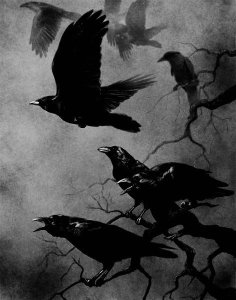 A task one hopes to complete and yet defers because it cannot be begun is perfectly expressed by the the word the Romans thought they heard in the cry of the raven – “cras, cras,” meaning “tomorrow, tomorrow” – and which symbolises hope as well as procrastination. This seems to aptly echo the predicament adumbrated by Sherwood Anderson in this essay “Certain Things Last”, which he wrote sometime in the twenties, and which was found among his papers and published only in 1992.
A task one hopes to complete and yet defers because it cannot be begun is perfectly expressed by the the word the Romans thought they heard in the cry of the raven – “cras, cras,” meaning “tomorrow, tomorrow” – and which symbolises hope as well as procrastination. This seems to aptly echo the predicament adumbrated by Sherwood Anderson in this essay “Certain Things Last”, which he wrote sometime in the twenties, and which was found among his papers and published only in 1992.
We do not know if it was ever intended for publication; indeed, we cannot even know for certain if he completed the piece. All writers feel this way at times about the things they write, because they know what a devilishly difficult job the task of writing can present. Noah’s raven, and the first to be released from the ark, (unlike his second envoy the docile dove) never returned. We may wonder what happened to it, and how it was reunited with its mate who presumably was released after the flood subsided. But reunited they must have been, on some hopeful ‘tomorrow,’ for the world veritably teems with ravens and their ilk.
Anderson’s ‘tomorrow,’ after a difficult boyhood and adolescence in the small and typically claustrophobic town of Clyde, Ohio, led to the occupation of writer. By his own account, his best known work, a compilation of 22 stories published under the title of Winesburg, Ohio, came to him all in a rush.
“…it was a late fall night and raining…I was there naked in the bed and I sprang up. I went to my typewriter and began to write. It was there, under those circumstances, myself sitting near an open window, the rain occasionally blowing in and wetting my bare back, that I did my first writing…I wrote it, as I wrote them all, complete in the one sitting…The rest of the stories in the book came out of me on succeeding evenings, and sometimes during the day while I worked in the advertising office…”
But “Some Things Last” seems to tell a different story. As the cry of the raven suggests, the exercise of writing requires the disordering of time. Anderson’s writing career commenced after a mental breakdown, shortly after which he abandoned his family. Four days after he ‘disappeared’, he was found thirty miles away in Cleveland, having walked that distance. He never went back home.
In order to make its way into writing, the past must be recollected, relived and recreated. It must sometimes be artificially rearranged and reordered before it can be placed in front of a reader, and if that weren’t enough cause for dismay, past and present, these two parallel and simultaneously unfolding tracks must be made to seem to come seamlessly together.
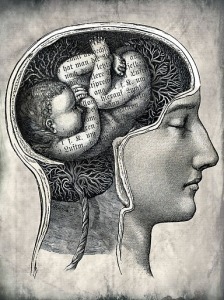 The task set for himself here by Anderson, that of trying to grasp at the flickering pattern cast by scattered thoughts and then to collect them for an arrangement to set on the page, is the perennial bane and delight of the writer. I don’t know if this is a task which may be better accomplished by a woman writer; certainly women like Virginia Woolf excelled at it, but Anderson shows us how a virtue may be made of stumbling. He conveys the slipperiness of the the whole process so vividly that even to someone who doesn’t think much about writing, the feeling of helplessness and unease comes wholly through. The hopeless feeling of being unable to ferry a thought from the having to the expressing of it is particularly acute when the ability to do it remains lost somewhere that is not amenable to recall. It is like floating in dark water and trying to remember how to move one’s arms and legs. I think this is in part because the language of recall is not strictly speaking ‘language’ but a kind of code conveyed in images.
The task set for himself here by Anderson, that of trying to grasp at the flickering pattern cast by scattered thoughts and then to collect them for an arrangement to set on the page, is the perennial bane and delight of the writer. I don’t know if this is a task which may be better accomplished by a woman writer; certainly women like Virginia Woolf excelled at it, but Anderson shows us how a virtue may be made of stumbling. He conveys the slipperiness of the the whole process so vividly that even to someone who doesn’t think much about writing, the feeling of helplessness and unease comes wholly through. The hopeless feeling of being unable to ferry a thought from the having to the expressing of it is particularly acute when the ability to do it remains lost somewhere that is not amenable to recall. It is like floating in dark water and trying to remember how to move one’s arms and legs. I think this is in part because the language of recall is not strictly speaking ‘language’ but a kind of code conveyed in images.
“Some Things Last” is writing thrice removed: it is writing that shows how a writer writes about writing. There is self-revelation in it, but only so much. Anderson is willing to reveal that he smokes somewhat to excess, but not that he drinks, though drink he did. His death in 1941 at the age of 64 – while he and his fourth wife Eleanor Copenhaver were on a cruise to South America – was caused by peritonitis following the accidental ingestion of a toothpick from either a martini or an hors d’ oeuvre, though I rather think it was the former than the latter.
Whether lubricated by alcohol or driven by digressiveness or restlessness, Anderson’s mind, resorts to narratives of flowing images, even as he anxiously attempts to impose order and structure on his wayward thoughts in order to secure an outcome. He in turn surrenders and attempts to control in order to impose a shape or a structure or even an account of something written. Indeed one cannot be certain if this piece of writing was guided to its intended conclusion, or if it simply petered out at an impasse or a cul de sac with nowhere else to go and no way to turn back. “What is the point?” we wonder. Is it only to show that the writing of a book is a difficult enterprise, and that someone who sets him- or herself to the task must contend with endless distractions, diversions and detours on the way to getting the job done? Or is it to reveal the unruly nature of the process, how the very thoughts that must make up the content turn out to be perturbations, which as they move away from their point of origin, take one further and further away from the goal? Writers must learn to negotiate these obstacles, for they can never quite be overcome.
even as he anxiously attempts to impose order and structure on his wayward thoughts in order to secure an outcome. He in turn surrenders and attempts to control in order to impose a shape or a structure or even an account of something written. Indeed one cannot be certain if this piece of writing was guided to its intended conclusion, or if it simply petered out at an impasse or a cul de sac with nowhere else to go and no way to turn back. “What is the point?” we wonder. Is it only to show that the writing of a book is a difficult enterprise, and that someone who sets him- or herself to the task must contend with endless distractions, diversions and detours on the way to getting the job done? Or is it to reveal the unruly nature of the process, how the very thoughts that must make up the content turn out to be perturbations, which as they move away from their point of origin, take one further and further away from the goal? Writers must learn to negotiate these obstacles, for they can never quite be overcome.
It would seem that a solution to the writer’s dilemma must be found in a skillful compromise. The kind of aimless undirected dreamy musings, the fragile repositories of vivid and detailed imagery, must be permitted to go on unimpeded 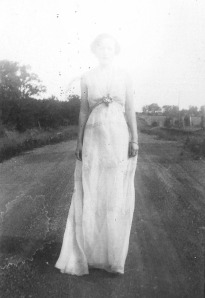 even as some agent of the thinking self stands by to take notes. And it seems that Anderson possessed a good note-taker, since it was he who wrote “She had on a dress of some clinging stuff and her slender figure made a very lovely line across the light” and “she was like a young tree you might see on a hill in a windstorm perhaps…..”
even as some agent of the thinking self stands by to take notes. And it seems that Anderson possessed a good note-taker, since it was he who wrote “She had on a dress of some clinging stuff and her slender figure made a very lovely line across the light” and “she was like a young tree you might see on a hill in a windstorm perhaps…..”
One of the chief difficulties of writing is that what is written about, the sights, smells and sensations of it, come almost always from a different time and place from when the writing takes place. They are imported from another world, which has to be recalled and recreated in the mind at the moment of writing. The writer has to recall them from when, like a traveller, he or she had to keep track of that place in the country, that path, and the details observed while on it, and the objects which were chosen to bring back from the journey. Then, as now, there were problems to be solved – what could properly be packed – what carried – and how these things would look when placed in the writer’s parlour or on the mantel. Would they bring back the sights and smells they seemed to be imbued with at the first encounter? Or would they become lifeless and incongruous when removed from their proper context, when forced to inhabit an unnatural place? Should the suggestion of the princess who lives in the castle at the end of the path along the green, wooded hill, be permitted to intrude? Yes, perhaps because it seems to echo the diffident insecurity this writer felt about his woman friend. And the blossoming trees, the evening light and the flowers in her dark hair must come along too. Then of course, black hair and Italian nights, which are shadowy counterparts of each other, must gain admittance as well. If in the next moments one ‘goes to his window to look out at the night,’ one might see, instead of the spark-sprinkled darkness of a sleeping city, “the moon and stars, and half-decayed trees in an old land.’
hair and Italian nights, which are shadowy counterparts of each other, must gain admittance as well. If in the next moments one ‘goes to his window to look out at the night,’ one might see, instead of the spark-sprinkled darkness of a sleeping city, “the moon and stars, and half-decayed trees in an old land.’
The thoughts and images we carry away from our inward travels seem to undergo a change when made to enter the outside world. They are like poems which resist being translated into a different language. The greatest care must be taken so that they do not become mere representations of what they truly are in their own voice and tongue. The difference between the inner and outer life is not always bridgeable, something most writers simultaneously accept and struggle mightily against.
The task of moving words from mind to paper, of trapping moments vivid with life and fixing them on the page, can seem daunting at times. The troublesomeness and difficulty of committing to memory the elusive phenomena of fleeting suggestions of thoughts and brief flares of barely glimpsed images as they pass through the mind 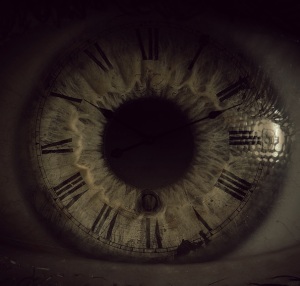 seem at times quite hopeless, and recollecting them seems like gathering leaves blown by the wind. Time too is not durable. It warps and bends in the attempt to draw it through the lens of memory. Are these what Anderson refers to as ‘the adventures of that certain moment?’ Are they fit to be the chosen subject of a piece of writing? Or should they be consigned to some vague designation of questionable value, to occupy the limbo between something which used to be either sustaining or memorable but is no longer, but is now discarded and stale as an old torn photograph or a half-eaten meal left neglected to grow cold on the kitchen table? Are these some things that last? Are they?
seem at times quite hopeless, and recollecting them seems like gathering leaves blown by the wind. Time too is not durable. It warps and bends in the attempt to draw it through the lens of memory. Are these what Anderson refers to as ‘the adventures of that certain moment?’ Are they fit to be the chosen subject of a piece of writing? Or should they be consigned to some vague designation of questionable value, to occupy the limbo between something which used to be either sustaining or memorable but is no longer, but is now discarded and stale as an old torn photograph or a half-eaten meal left neglected to grow cold on the kitchen table? Are these some things that last? Are they?
